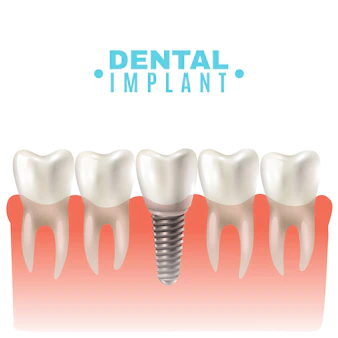Poland Dental Implant Prices
Dental implant is the name given to materials that have the feature of imitating the tooth root placed in the jawbone in areas where tooth loss occurs. Today, although many people think of having a dental implant, they are hesitant to think that this procedure is painful or painful. If you want your teeth to look more beautiful but are afraid of having dental implants, you can learn about this process by reading our article.
Why is Dental Implant Treatment Performed?

Implant surgery is the name given to the placement of artificial teeth that look like real teeth and function in the same way, which will replace missing teeth by replacing tooth roots with metal, screw-like materials. Dental implant surgery is one of the alternative methods that can be used instead of bridges or prostheses.
dental implant treatment differs depending on the type of implants and the condition of the jawbones. Dental implant treatment can have various procedures. The most important advantage of implants is that an extremely strong infrastructure is created for new teeth. The bone area where the implant is placed needs time to heal. Therefore, this treatment can take a long time.
Dental implants are surgically placed in the jawbone. In this way, it has the ability to take the roots of the missing teeth here. Since the titanium in the implant is completely fused with the jawbone, there are no situations such as slipping or making a sound in the implants. In addition, there are no cases of bone damage that can be caused by fixed bridge treatments and prostheses. There are no cases of decay or damage to the implant materials over time. Dental implants are mostly recommended in the following situations;
- Speech problems due to missing teeth
- Problems with one or more missing teeth
- Absence of disease states that will adversely affect bone healing
- Absence of an immature jawbone
- Having healthy oral tissue
- Having enough bone to fix the implants or having a bone graft
What Are the Risks of Dental Implants?
As with any surgery, there are risks with dental implants . These risks are usually quite rare. In addition, it has the feature of being easily treated if it occurs. Risks that may occur in treatment;
- Sinus problems caused by dental implants placed in the upper jaw protruding into one of the sinus cavities
- Occurrence of infection problems in the area where the implant is made
- Undesirable conditions such as pain, tingling, numbness may occur in natural teeth, jaw, gums, lips.
Preparation for Dental Implant Surgery
In the planning process for dental implants, dentists who specialize in treating tooth-supporting structures such as the jaw, mouth, face, gums and bones, dentists who design and place artificial teeth, and in some cases, otolaryngologists can be assisted.
Dental implants may require one or more surgical procedures. Therefore, it is important to perform various inspections before starting the procedure.
Comprehensive Dental Examination
First of all, a comprehensive dental examination is performed by taking dental x-rays and taking 3D images. It is important for patients to indicate to the dentist the prescription and over-the-counter medications they have used. In addition, information should be given about all the diseases that have been passed. If there is heart disease or orthopedic implants, the dentist starts antibiotic treatment to prevent a possible infection.
Treatment Plan
The treatment plan is made by considering components such as the jawbone condition, the number of missing teeth and their location.
In order to control the pain, anesthesia options are decided during the operation. Procedures can be performed under local anesthesia, general anesthesia or sedation. The dentist will correctly decide which option is best for you.
Depending on the type of anesthesia that the doctor will use, it is important to inform the patients about the planning of eating and drinking before the operation. If the surgery will be performed under sedation or general anesthesia, there should be people who will take the people home after the surgery.
What are the Stages of Dental Implant Surgery?
Dental implant surgery is a surgical procedure that is mostly done in stages. Care should be taken to include healing processes between procedures. Dental implant placement procedures are performed step by step.
- First, the extraction of damaged teeth is performed.
- If the jawbone is weak, the jawbones are strengthened.
- Dental implants are placed.
- The bone is expected to develop and heal.
- Thread screw is placed
- An artificial tooth is placed on the tooth screw.
The whole process can take months as there are quite a few steps. Most of this time is devoted to healing and growth of the jawbones. Depending on the condition of the patients, the special procedures performed or the materials used, certain steps of the treatment may be combined.
Bone Graft Application
If the jawbone is not thick enough or the bone is too soft, bone grafting may be necessary before implantation. Strong chewing movements in the mouth put great pressure on the bones. If the implant of the bone is not supported, there may be cases such as the failure of the surgery. The bone graft has the ability to form a much stronger bone foundation for the implant.
Various bone graft materials can be used to reconstruct the jawbone. With various options, the strengthening of the jaw bones can be achieved. Natural bone grafts from elsewhere in the body or bone replacement materials that can provide support structures for new bone growth can be used. Depending on the situation, the best options will be decided by the doctor.
It may take several months for the transplanted bones to become strong enough to support the dental implant. In cases where small bone graft is required, grafting can be performed together with implant surgery. The condition of the jawbone will determine how the treatment will proceed.
Placing the Dental Implant
place the dental implant, the gum must be opened surgically and the bone must be visible. Holes are drilled in the bone where the metal screw of the implant will be placed. The dental screw is deeply inserted into the bone as it will act as the root of the tooth.
After this process, there is still a gap in the part where the thread screw is inserted. If necessary, a temporary prosthetic tooth can be placed on the screw for aesthetic purposes. This temporary prosthesis can be removed and reattached while sleeping or for cleaning.
Bone Growth Waiting Time

metal implant is placed in the jawbone, the osseointegration period begins. During this period, the jawbone grows and merges with the surface of the dental implant. In this process, which can take several months, a solid foundation is created for the new artificial tooth.
Abutment Placement
Additional procedures may be required for abutment placement after the completion of the osseointegration period. These minor surgeries are mostly performed in an outpatient setting and under local anesthesia. To place the abutment ;
- The dentist needs to reopen the gum to make the implant visible.
- The abutment is attached to the implant.
- The gingival tissue is closed in such a way that the support piece remains on the upper part.
Sometimes the abutment is attached to the implant to which the abutment is attached. In this way, no additional surgical procedures are required. The support parts are visible above the gingival border when the mouth is opened. Some patients do not like this appearance and it may be preferable to place the support piece using a separate procedure. After the placement of the support piece, it is important to wait for the gums to heal within 2 weeks before the artificial tooth is inserted.
Installing the New Tooth
After the healing of the gums, a clearer trace of the appearance of the teeth is obtained. Dentists and patients can choose between removable, fixed or a combination of artificial teeth. According to the selections made, dentists place the tooth on the implant.
After Dental Implant
People may experience some discomfort after dental implants . These;
- light bleeding
- Swelling of the gums or face
- Pain at the implant site
- Bruising of the skin and gums
It may be necessary to use antibiotics or painkillers after implant surgery. If conditions such as discomfort and swelling worsen after surgery, it is extremely important to consult a doctor. After each stage of the surgery, patients should pay attention to consuming soft foods during the healing phase of the area. Dentists will prefer self-dissolving sutures to close wounds. Dentists can also remove them if the stitches do not dissolve on their own.
Dental Implant Surgery Results
Most dental implant treatments are successful. However, in some cases, there may be cases where the bones are not sufficiently fused to the metal implant. Negative factors such as smoking can cause treatment failure and various complications.
If the bone is not sufficiently fused, there may be cases of removal of the implant. After about three months, the bone is cleaned and the bone process can be tried again.
There are issues to be considered in terms of the success of the treatments performed on the teeth, as well as the health of the natural teeth.
Attention to Oral Hygiene
It is also very important to show the care shown to natural teeth to implants. Some specially designed brushes also help clean nooks and crannies around gums, teeth and metal parts.
Regular Dentist Check-up
Regular visits to dentists are an important issue in terms of controlling the health and function of implants. For a professional cleaning, it is necessary to follow the doctor’s recommendations.
Avoiding Harmful Habits
It is necessary to avoid chewing hard items such as hard candy, ice, shelled nuts that can cause natural and artificial teeth to break. Products that can stain teeth, such as caffeine and tobacco, should also not be consumed. A doctor should also be consulted for the treatment of clenching habits.
How Long Does Implant Dental Treatment Take?
If advanced applications have not been made to fuse the implants with the bone after placement, a healing period of 1-6 months is required depending on the bone quality, age and systemic conditions of the patients.
With the development of the surface properties of the implants used in today’s technology, temporary implant prostheses can be made. There are various factors that determine the time of prosthesis to be made on the implant.
Processes are much shorter in seamless implant applications. In seamless implants, these processes take between 6-9 minutes for each tooth. Dentists will determine the correct timing for their patients.
Things to Consider in Nutrition After Dental Implants
It is very important for patients to pay attention to the foods they eat during the post-implant fusion process. After the implant is inserted, care should be taken to consume soft foods at room temperature. If necessary, dentists may also recommend vitamin and mineral supplements to patients.
Dentists will specify how long patients should stay away from hot and cold foods, depending on the surgical procedure and the materials used. In order to protect the seams, it is necessary to avoid the consumption of very hard and grainy foods. About two weeks after the implant procedure, you can start feeding with foods such as grilled fish, omelette, pasta, boiled chicken.
Advantages of Implant Dental Treatment

Implant dental treatment method is revolutionary in the treatment of missing teeth with the developing technology. These practices are also highly successful in the long run. Advantages of the method;
- Basically, the implant provides a healthy natural chewing feeling, image and speech, as it takes the load of the dental prosthesis like a real tooth.
- It eliminates the necessity of moving the prosthesis.
- In the dental implant method, there is no need to use any other material to hold the dentures in place.
- Implants with high quality can be used for a lifetime thanks to good care.
- There is no such thing as interference with neighboring teeth during the procedure. Only necessary operations are performed on the relevant tooth.
- Implants perform the same functions as natural teeth. In addition, it will not cause difficulties in nutrition or dental care. Patients are comfortable as it gives a normal chewing feeling.
- It helps patients regain their self-confidence. It is also preferred in terms of providing an aesthetic smile.
- It doesn’t need much maintenance. Brushing and flossing are sufficient for implant teeth as with the main teeth.
Is Implant Treatment Painful?
Before the implant operation, the procedures are performed by giving local and sometimes general anesthesia to the patients. For this reason, patients will not feel pain or pain during the surgical procedure. Patients who are administered local anesthesia may experience mild pain during the day after the effect of anesthesia wears off. These pains are extremely normal and it is possible to relieve these pains with painkillers.
Is Implant Suitable for Children?
There is no harm in making dental implants for children. Since children are mobile, the risk of injury or accident is also extremely high. Depending on these risks, permanent teeth may be lost. In such cases, it would be more appropriate for children to have these procedures done after they have completed their growth and development.
Situations in which Dental Implant Treatment is Not Performed
- Smoking increases the risk of infection as it paves the way for bacterial plaque in the tissues of the mouth. Implant patients who smoke should stop smoking 15 days before treatment and up to one month after treatment.
- Implant treatment is not appropriate for patients with blood coagulation problems. Coagulation problems need to be eliminated first.
- Tissue healing is extremely slow in diabetic patients and the risk of infection is quite high. It is very important to consult a doctor before the operation in people with diabetes. Accordingly, surgical planning should be performed.
- Patients with hypertension have an overreaction to situations such as pain and stress. There may be acute elevations of blood pressure during treatment due to the overreaction to stimuli. Therefore, blood pressure measurements should be made before starting treatment in patients with hypertension. In case of doubt, a doctor’s consultation should be sought.
- In people with heart disease, evaluation is made after consultation with the doctors of the patients. Accordingly, the stages of treatment planning are carried out.
Dental Implant Treatment Prices in Poland
Dental implant treatment prices in Poland vary according to preferred clinics, dentists, the number of missing teeth, and the applications to be made. But in general, dental implants are quite expensive in Poland. There are countries where these transactions are done at much more affordable prices.
Dental Implant Treatment in Bulgaria
Bulgaria is a country that is frequently preferred in dental implant treatments due to its specialist dentists and well-equipped clinics. In this respect, medical tourism is also highly developed here. Tourists from abroad can be treated here at very affordable prices. Since food, drink and accommodation are also affordable, medical tourists may prefer Bulgaria for both vacation and treatment. You can contact us to get information about dental implant treatment i



